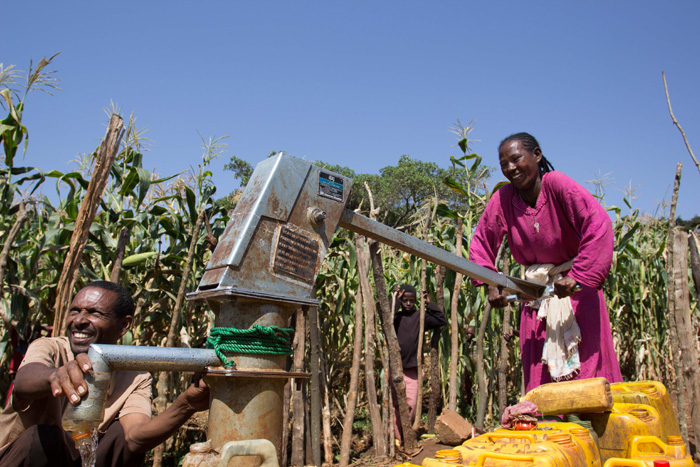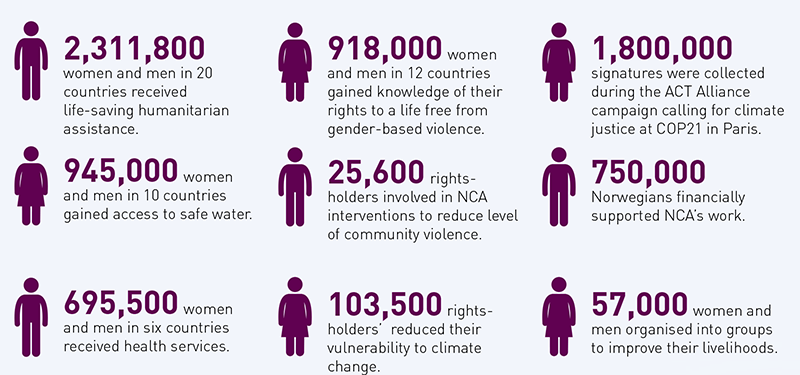
Global Report on Results

NCA’s Global Report on Results 2015 is the final annual report on results from NCA’s international programmes under the organisation’s Global Strategy 2011-2015.
It showcases results from all NCA activities regardless of the funding source, and provides a comprehensive picture of what we have achieved during the year. The report also presents key financial figures and results, including NCA’s Selected Output Indicators, from the whole strategic period.
The Norwegian Agency for Development Cooperation (Norad) remains NCA’s single largest donor granting NCA about NOK 296 million in 2015, including funds secured through the cooperation agreement QZA-10/0953. Grants from the Norwegian Ministry of Foreign Affairs (MFA) and the Royal Norwegian Embassies totalled around NOK 259 million in 2015 and were NCA’s second largest funding source. An additional NOK 214 million was raised in Norway through fundraising initiatives including private monthly donations; congregations; businesses; and the annual NCA Lenten Campaign and Fundraiser. The remainder of NCA’s 2015 income came from ACT Alliance members and their back donors such as the Department for International Development (DFID, UK) and agreements signed with global institutional donors such as UN OCHA, EuropeAid and the Dutch Ministry of Foreign Affairs. In 2015, NCA spent a net sum of NOK 884 million on international cooperation including related work in Norway (See Chapter 1.3 for more details). NCA extends its thanks to all those who have contributed to making its important work possible.
At the end of 2015, NCA was engaged in 21 focus countries applying an integrated approach combining long-term development, advocacy and emergency preparedness and response. In other countries, NCA also provided limited but strategic support in the form of humanitarian action or long-term development.
In 2016 NCA will embark on the first year of a new Global Strategy - Faith in Action. The document commits NCA to continue delivering high quality and cost effective programming by focusing on a smaller number of global programmes and engaging in fewer countries. As part of this, NCA’s programme office in Thailand was officially closed in 2015 whilst exit processes were initiated for country programmes in Vietnam, Laos, Kenya and Brazil along with components of the regional programme in Southern Africa. Regional programmes will be managed from the Kenya and South Africa offices following the phase-out of the main operations.
This report showcases our results from different perspectives. Chapter one presents some highlights from what NCA has achieved in 2015 in collaboration with faith-based actors, along with results in mobilising resources, including diversifying the funding base. Chapter two focuses on results stemming from NCA’s presence around the globe, whilst chapter three comprises the bulk of the report summarising results from NCA’s global programmes. Chapter four presents a selection of achievements from NCA’s humanitarian response, while chapter five shows results from NCA’s advocacy work for global justice. Chapter six presents highlights from NCA and partner organisations’ learning and development in 2015 within areas such as accountability, anti-corruption and evaluation practice. In chapter seven we look forward, introducing NCA’s new strategy and programme plan. We reflect on how NCA and faithbased partners together foster an agenda for social change, documented in NCA’s 15 years commitment to working with religious leaders and faith communities to change attitudes related to people living with HIV and AIDS (PLWHA) and later sexual minorities.
Results from NCA’s commitment to mobilise and develop the capacity of civil society are presented throughout the report, as well as NCA’s responsiveness to the rights of indigenous peoples – this final category of results is marked with a symbol for easy identification.

Next Chapter: 1. This is Norwegian Church Aid
Back